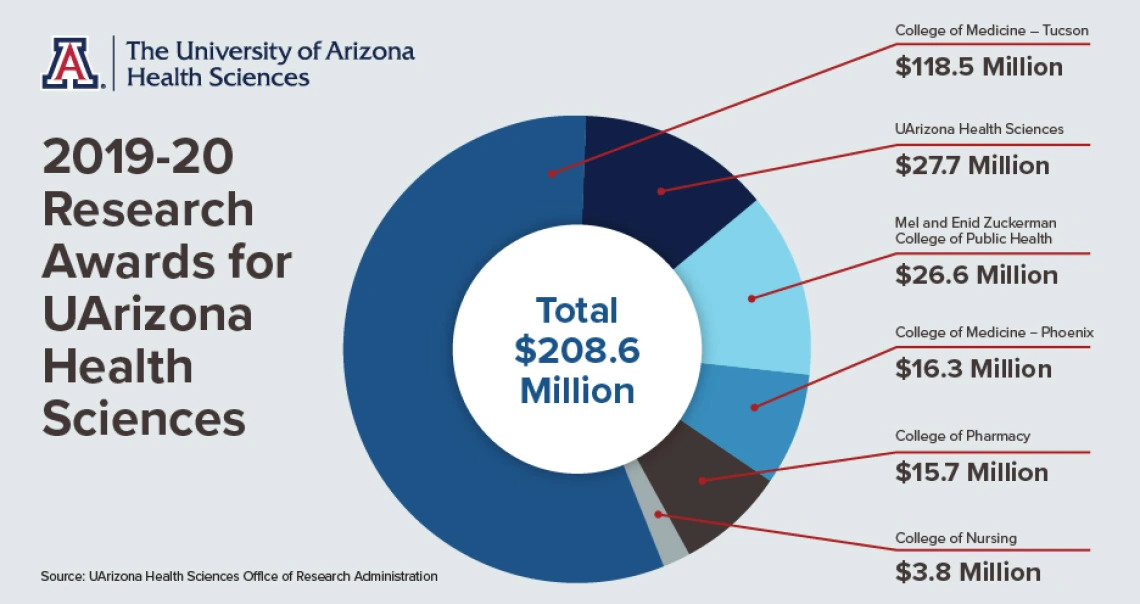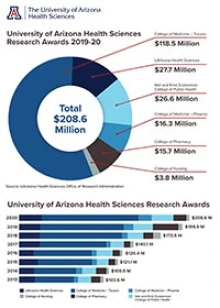UArizona Health Sciences Exceeds $200M in Research Funding for First Time, Boosted by COVID-19 Collaborations
University of Arizona Health Sciences passes $200 million milestone in research funding in fiscal year 2020, addressing some of the world’s most challenging health conditions, including COVID-19.

TUCSON, Ariz. – The University of Arizona Health Sciences was awarded 418 research grants, contracts and awards in fiscal year 2020, receiving a record $208.6 million in funding.

Breakdown by college of how the University of Arizona Health Sciences research funding was distributed for fiscal years 2020 to 2013. Click to enlarge.
The top 25 UArizona Health Sciences research grants and awards account for nearly three-quarters of the total, with a large portion of that total – more than two-thirds – awarded directly by the National Institutes of Health (NIH). The overall amount represents a more than 100% increase for Health Sciences since 2013.
“This significant increase in funding at the University of Arizona Health Sciences is a remarkable achievement, even more so as COVID-19 forced our research community to quickly pivot its efforts to address its devastating impact,” said University of Arizona President Robert C. Robbins, MD. “I commend our investigators, support staff and clinical partners at Banner – University Medicine in this team effort to secure funding, not only for battling the novel coronavirus, but also the many other serious health conditions that will be addressed by this research in the years to come.”
“I congratulate the innovative investigators at the University of Arizona Health Sciences,” said Michael D. Dake, MD, senior vice president for Health Sciences. “Their hard work, ingenuity and dedication to finding remedies for our most challenging health problems – including COVID-19 – has directly led to this record funding. The health-care advances their research uncovers will benefit Arizonans and many others across the country and around the world.”

Dr. Michael Dake, senior vice president for UArizona Health Sciences
Notable projects that received funding range from a $37.5 million effort to develop the first regenerative therapeutic for Alzheimer’s disease to development of a diagnostic test that interfaces with a smartphone to rapidly detect bio-threats, which won an award of $4.36 million.
Health Sciences nearly surpassed the $200 million milestone the previous fiscal year, but the actual figure came in just below at $199.9 million.
Jason Wertheim, MD, PhD, associate professor of surgery and vice dean for research and graduate studies at the UArizona College of Medicine – Tucson, underscored the multidisciplinary nature of the research teams at Health Sciences.
“The increase in funding is a direct result of the very careful and dedicated work of the investigators and teams across many different disciplines. And the story doesn’t end here. Now, we get to do the exciting science,” Dr. Wertheim said.

Drs. Jason Wertheim and Roberta Diaz Brinton
The year’s largest grant – a $37.5 million, five-year research award to support the National Alzheimer’s Project Act – was awarded to Roberta Diaz Brinton, PhD, director of the Center for Innovation in Brain Science, Regents Professor of pharmacology and neurology at the College of Medicine – Tucson, and a member of the BIO5 Institute and the scientific advisory committee for the Evelyn F. McKnight Brain Institute.
“This record funding achievement is a testament to the bold spirit of innovation and the quality of the research enterprise at the UArizona Health Sciences,” Dr. Brinton said. “Our $37.5 million National Institute on Aging grant is the result of decades of research that, if successful, would result in the first regenerative therapeutic for Alzheimer’s disease.”
The top 10 grant awards for FY2020 are:
- Roberta Diaz Brinton, PhD (Center for Innovation in Brain Science): $37.5 million from the National Institute on Aging for research of a potential regenerative therapy for Alzheimer’s disease.
- Jeff Burgess, MD, MPH (Mel and Enid Zuckerman College of Public Health): $7.77 million from the Centers for Disease Control and Prevention to identify patterns of COVID-19 immunity over time in previously and newly infected individuals.
- Donna Zhang, PhD (College of Pharmacy): $7.45 million from the National Institute of Environmental Health Sciences to determine factors in environmental stress and disease intervention.
- Clara Curiel-Lewandrowski, MD (Skin Cancer Institute, UArizona Cancer Center): $6.9 million from the National Cancer Institute for program project grant to study biomarkers and molecular pathways to prevent nonmelanoma skin cancers.
- Margaret Briehl, PhD (UArizona Cancer Center): $6.85 million from National Cancer Institute to continue cancer research, training and outreach programs serving Arizona Native American communities.
- Kathleen Rodgers, PhD (Center for Innovation in Brain Science): $6.1 million from the National Institute on Aging to advance development of a small molecule Mas agonist as a therapy for Alzheimer’s disease.
- Fernando Martinez, MD (Asthma and Airway Disease Research Center): $6.03 million funding renewal from the National Heart, Lung, and Blood Institute to continue the Tucson Children’s Respiratory Study, which is headed into its fifth decade looking into origins of – as well as therapies for – asthma and chronic obstructive pulmonary disease worldwide.
- Meredith Hay, MD (Department of Physiology, College of Medicine – Tucson): $5.72 million from the National Institute on Aging to prepare for clinical trials of a novel peptide therapy to treat vascular dementia.
- Michael D. Dake, MD (UArizona Health Sciences): $5.05 million from the NIH to build a new home for the Center for Sleep and Circadian Sciences, whose director is Sairam Parthasarathy, MD, chief of the Division of Pulmonary, Allergy, Critical Care and Sleep Medicine at the College of Medicine – Tucson.
- Frederic Zenhausern, PhD (Center for Applied NanoBioscience and Medicine, College of Medicine – Phoenix): $4.36 million (in contract valued up to $9.5 million) from the Department of Defense for development of the VERIFAST (Vertical Integrated Flow Assay System Technology) program for multiple pathogen detection.
# # #
A more in depth article on this topic appears on the UArizona Health Sciences Connect website.
NOTE: Graphics and photos available here – https://arizona.box.com/s/tf5gc824jp3v4p6176d55b8czrwsbvz8.
About the University of Arizona Health Sciences
The University of Arizona Health Sciences is the statewide leader in biomedical research and health professions training. UArizona Health Sciences includes the Colleges of Medicine (Tucson and Phoenix), Nursing, Pharmacy, and the Mel and Enid Zuckerman College of Public Health, with main campus locations in Tucson and the Phoenix Biomedical Campus in downtown Phoenix. From these vantage points, Health Sciences reaches across the state of Arizona, the greater Southwest and around the world to provide next-generation education, research and outreach. A major economic engine, Health Sciences employs nearly 5,000 people, has approximately 4,000 students and 900 faculty members, and garners $200 million in research grants and contracts annually. For more information: uahs.arizona.edu (Follow us: Facebook | Twitter | YouTube | LinkedIn | Instagram).

